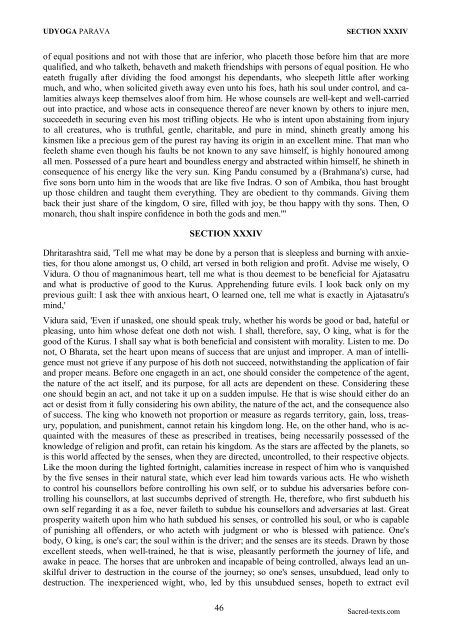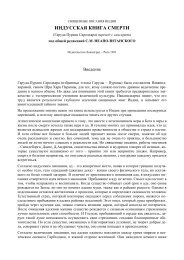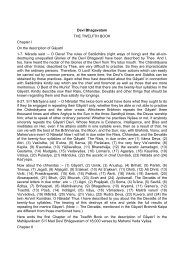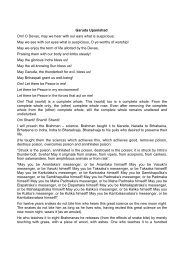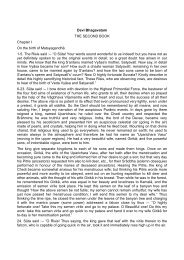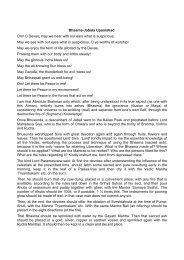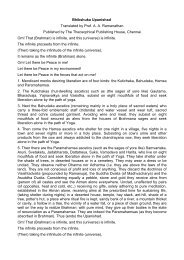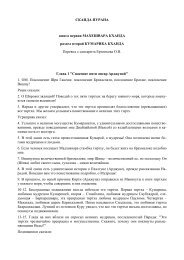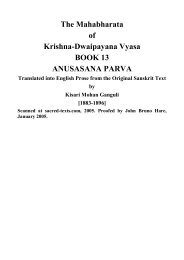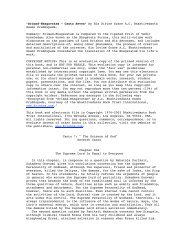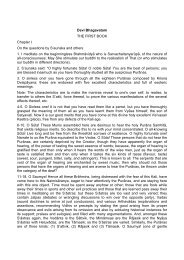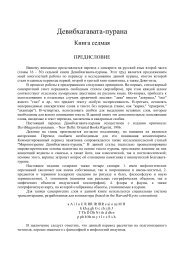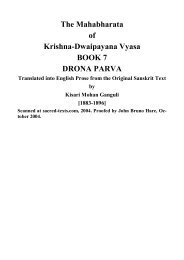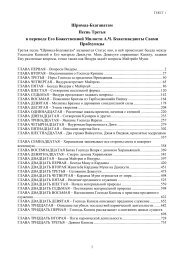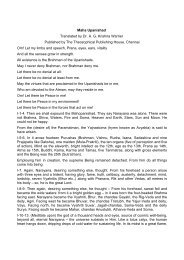Mahabharata 05 (eng)..
Mahabharata 05 (eng)..
Mahabharata 05 (eng)..
Create successful ePaper yourself
Turn your PDF publications into a flip-book with our unique Google optimized e-Paper software.
UDYOGA PARAVA<br />
SECTION XXXIV<br />
of equal positions and not with those that are inferior, who placeth those before him that are more<br />
qualified, and who talketh, behaveth and maketh friendships with persons of equal position. He who<br />
eateth frugally after dividing the food amongst his dependants, who sleepeth little after working<br />
much, and who, when solicited giveth away even unto his foes, hath his soul under control, and calamities<br />
always keep themselves aloof from him. He whose counsels are well-kept and well-carried<br />
out into practice, and whose acts in consequence thereof are never known by others to injure men,<br />
succeedeth in securing even his most trifling objects. He who is intent upon abstaining from injury<br />
to all creatures, who is truthful, gentle, charitable, and pure in mind, shineth greatly among his<br />
kinsmen like a precious gem of the purest ray having its origin in an excellent mine. That man who<br />
feeleth shame even though his faults be not known to any save himself, is highly honoured among<br />
all men. Possessed of a pure heart and boundless energy and abstracted within himself, he shineth in<br />
consequence of his energy like the very sun. King Pandu consumed by a (Brahmana's) curse, had<br />
five sons born unto him in the woods that are like five Indras. O son of Ambika, thou hast brought<br />
up those children and taught them everything. They are obedient to thy commands. Giving them<br />
back their just share of the kingdom, O sire, filled with joy, be thou happy with thy sons. Then, O<br />
monarch, thou shalt inspire confidence in both the gods and men.'"<br />
SECTION XXXIV<br />
Dhritarashtra said, 'Tell me what may be done by a person that is sleepless and burning with anxieties,<br />
for thou alone amongst us, O child, art versed in both religion and profit. Advise me wisely, O<br />
Vidura. O thou of magnanimous heart, tell me what is thou deemest to be beneficial for Ajatasatru<br />
and what is productive of good to the Kurus. Apprehending future evils. I look back only on my<br />
previous guilt: I ask thee with anxious heart, O learned one, tell me what is exactly in Ajatasatru's<br />
mind,'<br />
Vidura said, 'Even if unasked, one should speak truly, whether his words be good or bad, hateful or<br />
pleasing, unto him whose defeat one doth not wish. I shall, therefore, say, O king, what is for the<br />
good of the Kurus. I shall say what is both beneficial and consistent with morality. Listen to me. Do<br />
not, O Bharata, set the heart upon means of success that are unjust and improper. A man of intelligence<br />
must not grieve if any purpose of his doth not succeed, notwithstanding the application of fair<br />
and proper means. Before one <strong>eng</strong>ageth in an act, one should consider the competence of the agent,<br />
the nature of the act itself, and its purpose, for all acts are dependent on these. Considering these<br />
one should begin an act, and not take it up on a sudden impulse. He that is wise should either do an<br />
act or desist from it fully considering his own ability, the nature of the act, and the consequence also<br />
of success. The king who knoweth not proportion or measure as regards territory, gain, loss, treasury,<br />
population, and punishment, cannot retain his kingdom long. He, on the other hand, who is acquainted<br />
with the measures of these as prescribed in treatises, being necessarily possessed of the<br />
knowledge of religion and profit, can retain his kingdom. As the stars are affected by the planets, so<br />
is this world affected by the senses, when they are directed, uncontrolled, to their respective objects.<br />
Like the moon during the lighted fortnight, calamities increase in respect of him who is vanquished<br />
by the five senses in their natural state, which ever lead him towards various acts. He who wisheth<br />
to control his counsellors before controlling his own self, or to subdue his adversaries before controlling<br />
his counsellors, at last succumbs deprived of str<strong>eng</strong>th. He, therefore, who first subdueth his<br />
own self regarding it as a foe, never faileth to subdue his counsellors and adversaries at last. Great<br />
prosperity waiteth upon him who hath subdued his senses, or controlled his soul, or who is capable<br />
of punishing all offenders, or who acteth with judgment or who is blessed with patience. One's<br />
body, O king, is one's car; the soul within is the driver; and the senses are its steeds. Drawn by those<br />
excellent steeds, when well-trained, he that is wise, pleasantly performeth the journey of life, and<br />
awake in peace. The horses that are unbroken and incapable of being controlled, always lead an unskilful<br />
driver to destruction in the course of the journey; so one's senses, unsubdued, lead only to<br />
destruction. The inexperienced wight, who, led by this unsubdued senses, hopeth to extract evil<br />
46 Sacred-texts.com


